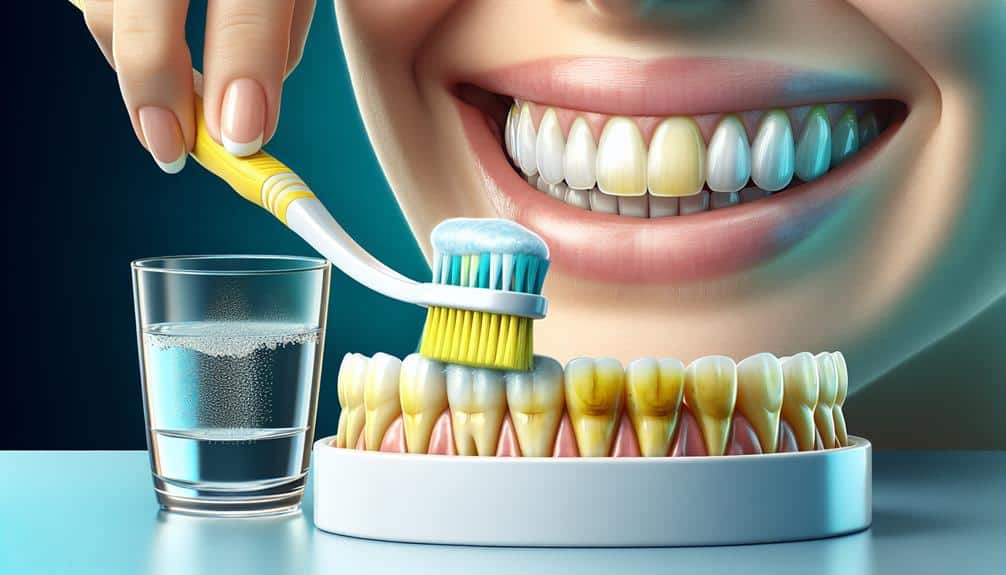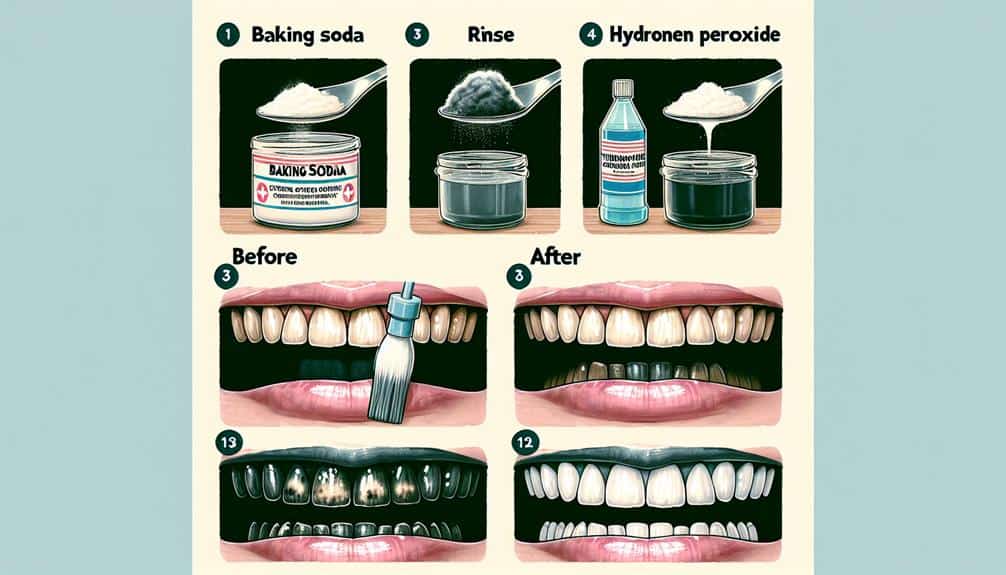To brighten tetracycline-stained teeth naturally, try lemon juice with baking soda for mild abrasion and bleaching power. Coconut oil pulling fights bacteria, plaque, and inflammation, promoting fresher breath. Activated charcoal brushing absorbs staining compounds effectively without harming enamel. These solutions offer potential to enhance your smile and oral hygiene.
Key Points
- Tetracycline stains respond well to activated charcoal brushing.
- Coconut oil pulling can aid in reducing tetracycline stains gently.
- Lemon juice and baking soda may help lighten tetracycline stains.
- Use natural remedies moderately to prevent enamel damage.
- Consult a dentist for personalized advice on tetracycline stain treatments.
Lemon Juice and Baking Soda
For a vital teeth whitening solution, you can consider combining lemon juice with baking soda for potential benefits. Lemon juice contains citric acid, which has natural bleaching properties that may help whiten teeth. Baking soda, on the other hand, is mildly abrasive and can assist in removing surface stains. When combined, these two ingredients create a paste that some believe can help brighten teeth.
However, it's important to be cautious when using this mixture due to its acidic effects. The acidic nature of lemon juice can potentially lead to enamel erosion if used excessively or for prolonged periods. Enamel erosion is a serious concern as it can weaken the protective layer of your teeth, making them more susceptible to decay and sensitivity. It's advisable to use this natural teeth whitening remedy sparingly and not as a daily routine to minimize the risk of enamel damage. Remember, moderation is key when experimenting with natural remedies for teeth whitening.
Coconut Oil Pulling
Consider incorporating coconut oil pulling into your oral care routine for potential benefits in promoting dental health and possibly aiding in teeth whitening. Coconut oil pulling is an ancient practice known for its oral hygiene benefits. Here's why you should give it a try:
- Antibacterial properties: Coconut oil contains lauric acid, which has been shown to have antibacterial properties that can help reduce harmful bacteria in the mouth.
- Plaque reduction: The act of swishing coconut oil in your mouth helps to loosen plaque, making it easier to remove during brushing.
- Gum health: Coconut oil pulling may help reduce inflammation in the gums and promote overall gum health.
- Fresh breath: By eliminating bacteria and toxins in the mouth, coconut oil pulling can help freshen your breath.
- Natural remedy: This method is a natural remedy that doesn't contain any harsh chemicals, making it a gentle option for those looking to improve their oral health.
Incorporating coconut oil pulling into your routine can be a simple yet effective addition to your oral care regimen.
Activated Charcoal Brushing
Enhance your oral hygiene routine by exploring the benefits of activated charcoal brushing. Activated charcoal, despite its dark color, has gained popularity for its teeth-whitening properties. It works by adsorbing compounds that stain teeth, making it an effective natural solution for brightening your smile.
One of the main charcoal benefits is its ability to remove surface stains from the teeth without being too abrasive on the enamel. Activated charcoal is a highly porous substance that binds to toxins and chemicals, including those that cause discoloration on the teeth. When used in brushing, it can help lift these stains, revealing a whiter appearance.
While activated charcoal can be beneficial for teeth whitening, it's important to use it sparingly. Excessive use or scrubbing too hard may wear down the tooth enamel over time. Hence, it's recommended to incorporate activated charcoal brushing into your oral care routine in moderation to enjoy its whitening effects without compromising the health of your teeth.
Frequently Asked Questions
Are There Any Potential Side Effects of Using Lemon Juice and Baking Soda for Teeth Whitening?
When using lemon juice and baking soda for teeth whitening, be cautious. Lemon juice can erode enamel, leading to sensitivity. Baking soda is generally safe but may cause abrasion with excessive use. Consider consulting a dentist for guidance.
How Frequently Should Coconut Oil Pulling Be Done to See Results?
To see results from coconut oil pulling, do it daily for about 15-20 minutes. The benefits of coconut oil include its effectiveness in removing toxins and improving oral health. Consistency is key for best outcomes.
Can Activated Charcoal Brushing Be Used as a Long-Term Solution for Teeth Whitening?
Activated charcoal brushing can offer short-term teeth whitening benefits due to its absorbent properties. However, as a long-term solution, it may not be ideal. Its abrasiveness can wear down enamel over time, compromising dental health.
Are There Any Specific Types of Activated Charcoal That Should Be Used for Brushing?
When choosing activated charcoal for brushing, consider types like coconut or bamboo charcoal for best results. These varieties have shown higher effectiveness in removing stains. Proper brushing techniques with the right charcoal can yield brighter smiles.
How Long Should One Wait After Using These Natural Solutions Before Consuming Food or Drinks?
After using natural solutions for teeth whitening, you should wait at least 30 minutes before consuming food or drinks. This waiting time allows the solution to be effective. For best results, use these solutions 2-3 times a week.



